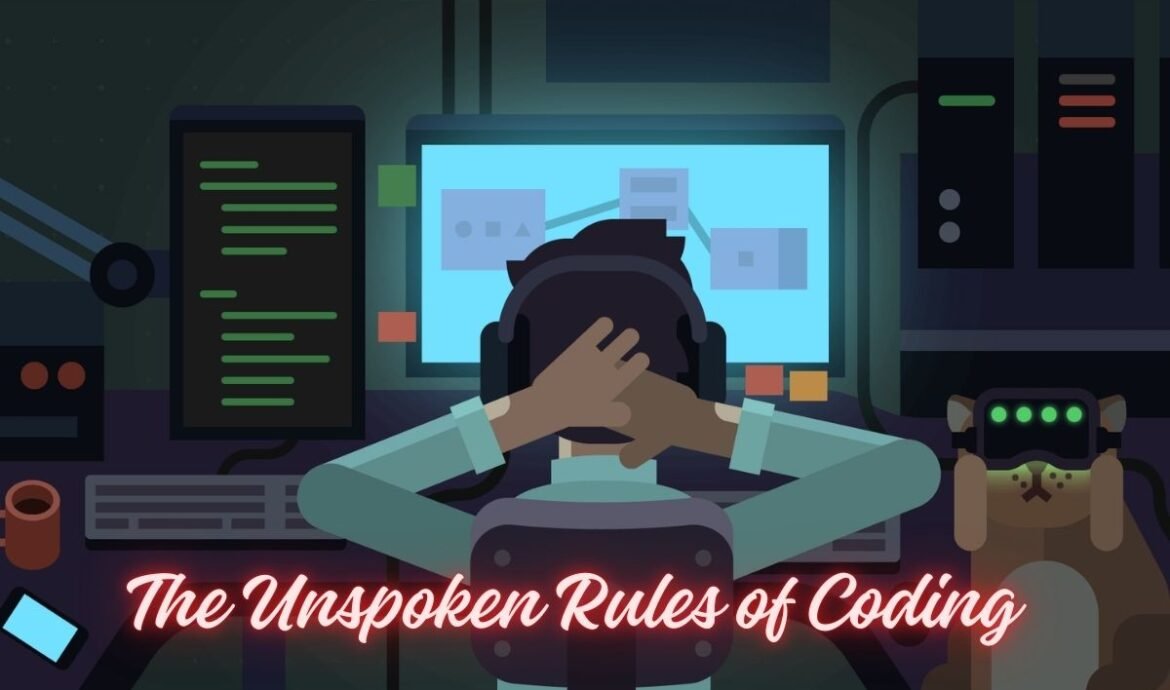
The Unspoken Rules of Coding for Both Novice and Sage Developers
Patricia Mary January 24, 2025 ArticleCoding is a language that bridges the gap between human creativity and machine logic. Whether you are just starting out or are a seasoned developer, the rules of coding go beyond syntax and structure. There are a set of unspoken rules that guide how developers write, maintain, and communicate code. Understanding and embracing these “rules” can drastically improve your productivity and the quality of your codebase. In this article, we’ll dive into the unspoken rules of coding for developers of all levels, from novice to sage.
Table of Contents
ToggleWhy Unspoken Rules Matter
The world Unspoken of coding is often overwhelming, with numerous frameworks, languages, and tools to consider. However, following a set of best practices ensures that code is not only functional but also scalable, maintainable, and easy to understand. While the technical specifications of coding languages are well-documented, the unspoken rules often come from years of developer experience and community norms.
These unspoken rules can help developers avoid common pitfalls, enhance collaboration, and reduce errors in code. Moreover, the right habits improve code readability, making it easier for other developers (and even future versions of yourself) to understand and build on your work.
The Unspoken Rules Every Developer Should Follow
1. Write Clean, Readable Code
- Novice: As a beginner, it’s easy to focus on making things work. However, it’s crucial to write code that is readable, well-organized, and understandable. Clear variable names, proper indentation, and comments help others (or future you) understand your logic.
- Sage: Experienced developers understand that clean code not only makes it easier for others to follow but also makes it more maintainable. Keeping code simple, modular, and avoiding unnecessary complexity should be a priority. Review and refactor your code regularly.
2. Comment Your Code Wisely
- Novice: At the start, you might think that commenting everything is a good practice, but too many comments can clutter your code. Instead, use comments to explain the why behind complex logic or decisions rather than describing what the code is doing.
- Sage: Senior developers understand that writing self-explanatory code through meaningful function and variable names reduces the need for excessive comments. Focus comments on explaining the intent or rationale behind a design decision.
3. Use Version Control
- Novice: Version control might seem unnecessary when you’re working solo on a small project, but it’s essential even for beginners. Tools like Git allow you to track changes, collaborate with others, and rollback when things go wrong.
- Sage: Experienced developers use Git or other version control systems as an integral part of their workflow. They commit frequently, write meaningful commit messages, and collaborate seamlessly with teammates using branches and pull requests.
4. Avoid Repetition – DRY Principle
- Novice: In the beginning, you might find it easier to copy and paste code. However, repeating code leads to redundancy and bugs. Embrace the Don’t Repeat Yourself (DRY) principle and refactor your code to keep it concise and reusable.
- Sage: Sage developers are experts in abstracting code into reusable components, functions, or modules. They follow the DRY principle meticulously and avoid unnecessary repetition by using libraries, frameworks, and design patterns.
5. Test Your Code
- Novice: Testing might seem like an afterthought, but it’s crucial to ensure your code works as expected. Start with simple unit tests to validate the core functionality of your code.
- Sage: Experienced developers prioritize testing at all stages of development, from unit tests to integration tests. They implement automated testing to catch errors early and improve the reliability of their applications.
6. Write Modular Code
- Novice: When you’re just starting out, you might write monolithic code that does everything in a single script or function. However, this approach can be hard to manage as projects grow. Break your code into smaller, reusable functions or classes.
- Sage: Senior developers focus on creating modular, reusable, and loosely coupled components. They apply SOLID principles (Single Responsibility, Open/Closed, Liskov Substitution, Interface Segregation, and Dependency Inversion) to ensure their code is scalable and maintainable.
7. Follow Consistent Naming Conventions
- Novice: Beginners often struggle with naming variables, functions, and classes. It’s tempting to use short or ambiguous names, but proper naming conventions make your code more readable. Follow the conventions of the language you’re working with.
- Sage: Experienced developers follow consistent naming conventions that improve clarity. They use descriptive names for variables, functions, and methods and adhere to naming standards like camelCase, PascalCase, or snake_case based on the project’s requirements.
8. Optimize Only When Necessary
- Novice: As a beginner, you might be tempted to optimize your code prematurely. However, optimizing too early can lead to unnecessary complexity and wasted time. First, ensure the code is correct and functional before focusing on performance.
- Sage: Seasoned developers understand that optimization should be driven by performance profiling. They avoid premature optimization and focus on improving performance only after identifying real bottlenecks through testing.
9. Adopt Code Reviews
- Novice: It can be intimidating to have others review your code, but code reviews are a vital part of improving your skills. Ask for feedback from more experienced developers to learn from their insights.
- Sage: Senior developers actively participate in code reviews, not only to catch bugs but also to mentor junior developers and improve the overall quality of the codebase. Constructive feedback should be delivered in a respectful and supportive manner.
10. Stay Updated and Keep Learning
- Novice: As a new developer, it’s essential to continue learning. Keep up with new technologies, languages, and best practices. Participate in developer communities, attend meetups, and read blogs and books to expand your knowledge.
- Sage: Senior developers are lifelong learners. They keep up with trends in technology and regularly update their skill sets. They mentor others and contribute to open-source projects, sharing their expertise with the community.
The Role of Collaboration and Communication in Coding
Coding is rarely a solitary task. Collaboration and communication are key to producing high-quality software. Whether you’re working in a team or contributing to an open-source project, it’s essential to communicate clearly with others.
- Novice: For new developers, communication can be challenging. Be honest about what you know and what you’re struggling with. Don’t hesitate to ask questions and seek clarification.
- Sage: Experienced developers know that effective communication is just as important as writing code. They explain complex ideas in simple terms, provide constructive feedback, and facilitate collaboration through documentation and clear code comments.
Unspoken Best Practices: A Quick Reference Table
| Rule | Novice Guidance | Sage Developer Advice |
|---|---|---|
| Code Readability | Focus on indentation and descriptive variable names. | Keep code simple, modular, and easy to follow. Refactor often. |
| Version Control | Learn Git basics and commit frequently. | Use Git branches and follow consistent commit practices. |
| Avoid Duplication (DRY) | Don’t repeat code. Create reusable functions. | Abstract repetitive code into libraries or modules. |
| Testing | Start with unit tests and basic validation. | Implement comprehensive automated tests and Continuous Integration. |
| Modular Code | Break down tasks into smaller functions. | Ensure high cohesion and low coupling between modules. |
| Naming Conventions | Use clear and descriptive names. | Follow industry-standard conventions and remain consistent. |
| Optimization | Don’t worry about performance until necessary. | Profile performance before making optimizations. |
| Code Reviews | Participate and seek feedback. | Provide constructive feedback and focus on code quality. |
| Continuous Learning | Stay curious and explore new resources. | Attend conferences, read papers, and stay on top of trends. |
Conclusion
Coding is more than just writing lines of code; it’s about writing efficient, maintainable, and understandable software. By following these unspoken rules, developers—whether novice or sage—can improve their code quality, collaborate more effectively, and contribute to better software development practices. The key is to always aim for improvement, embrace best practices, and never stop learning.
You may also like
Archives
Calendar
| M | T | W | T | F | S | S |
|---|---|---|---|---|---|---|
| 1 | 2 | 3 | 4 | 5 | 6 | |
| 7 | 8 | 9 | 10 | 11 | 12 | 13 |
| 14 | 15 | 16 | 17 | 18 | 19 | 20 |
| 21 | 22 | 23 | 24 | 25 | 26 | 27 |
| 28 | 29 | 30 | 31 | |||

Leave a Reply